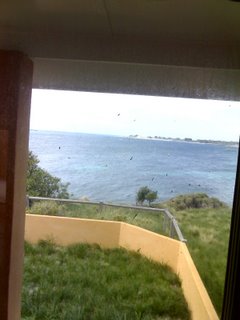
Rotto Bloggo had our feelance hat on yesterday, doping out the story of oil near Rottnest.
The result is in today's edition of the Post - a fine paper...
A Melbourne energy company is optimistic about finding commercial quantities of oil near Rottnest Island, off Perth, and hopes to drill an exploratory well as soon as next year.
Nexus Energy, an ASX-listed company, says there are potential reservoirs of at least 200 million barrels of oil in the Rottnest trough, in its Vlaming Sub Basin permit.
If exploration goes well and the oil is there, production will begin in two to three years.
Company managing director Ian Tchacos said the permit area covers more than 1800 sq km.
“The area we’re going to be drilling in is about 15km from Rottnest and the same from the shoreline,” Mr Tchacos said. “Obviously you’ll notice a rig and a drilling ship there, because it’ll look different to ships that are anchored. But we were shooting seismic surveys for a month and no-one noticed.”
Nexus did its seismic surveys in August, when it thought there would be minimal whale movement off the Perth/Rottnest area.
“But we sighted lots of whales: we had a spotter plane up there and we were continually shutting down our seismic program to enable us to shoot it without disturbing the whales,” Mr Tchacos said.
There would be no impact on tourism, and little risk of pollution. An oil rig off Rottnest and the coast would pose less of a threat to the environment than oil tankers going in and out of Kwinana.
“I’ve got a boat myself and I’m a diver,” Mr Tchacos said.
“I believe the oil industry is so advanced you can do this sort of thing responsibly. New-generation oil developments mean you can do a lot of this sub-sea – you don’t need to do anything above the surface.
“All the ingredients for a significant field are there: it is under-explored.”
There would be “at leats another couple” of exploratory wells before any production begins.
Mr Tchacos said it was too early to say to whom the oil would be sold.
“You wouldn’t know until you’ve made the discovery and you know the product you have,” he said.
“But we’re optimistic: the shortage of light crude oil in the region will be good for us.”
Nexus would work with recreational and commercial fishers, as well as whale-watching firms, during further approval stages.
Rottnest is WA’s most-visited tourist destination, with half a million people setting foot on the island last financial year.
The WA Department for Industry and Resources confirmed Nexus was granted its permit to explore for oil and gas last year.
“There is a commitment to drill a well…by July 2008,” a Department spokesman said.
The spokesman said chances of an oil spill or other environmental damage are “extremely remote”.
“All field activities have to be approved by DoIR before they are conducted and must meet stringent health, safety and environmental standards.
“Field activities are conducted after consultation with relevant parties that might be affected.”
The Rottnest Society said the idea of an oil rig off the island was “alarming”.
“Oh dear,” said the Society’s Sue Folks, when told by The Post about the exploration.
“I can’t imagine people being very happy with drilling in sight of the coast.
“I’ve seen Barrow Island, and I know what that looks like.
“There’s always risk in drilling for oil.”
Chris Burton from Western Whale Research was on the Nexus boat when it was doing its seismic surveys.
He said it was an opportunity for whale researchers to get information about humpbacks they wouldn’t otherwise obtain.
“Nexus abided by the guidelines for seismic shooting: if whales got too close they shut the shooting down.
“I don’t think an oil well would be that invasive for whales: the noise impact from drilling would be less than that from seismic surveys.
Humpback whales migrate from the Antarctic up the WA coast to the Kimberley.
Mr Burton said there had been an increase in humpback numbers off the coast of WA’s north despite the offshore activity of the state’s booming oil and gas industry.Last month the WA Government said petroleum was the state’s largest resource sector, and had jumped by 23 per cent in the last financial year. Mineral and petroleum sales from WA reached more than $43 billion in 2005-06.


No comments:
Post a Comment